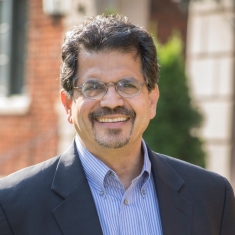Safe Operation Analysis of Vehicle Dynamics Under Parameter Uncertainty Using the Koopman Spectrum Approach

Professor Atul Kelkar
Fellow ASME, Associate Fellow, AIAA, Senior Member, IEEE
D. W. Reynolds Distinguished Professor and ME Chair Clemson University
Abstract: The seminar will begin with an overview of Dr. Kelkar’s overall research portfolio with a brief description of key research projects and new initiatives. The second part of the talk will focus on the work of his research team in modeling and prediction of dynamic systems response under uncertainties using Koopman Spectrum Approach. This work was recently recognized by the 2023 Modeling Estimation and Control Conference Best Paper Award.
Koopman theory, is a mathematical tool used to understand the behavior of dynamical systems by studying their associated Koopman operator. Koopman is a linear operator which acts on a set of observables (functions) and resulting evolution of these functions can be used to study systems’ behavior as opposed to computing the evolution of the states. This allows highly efficient computational analysis of nonlinear systems using linear framework including a data-driven approach. While the problem of finding the right choice of observables remains an open problem for the researchers, there are several known sets of functions that can be used for a large class of systems.
Ground vehicles operate under widely varying terrain conditions. As such, it is important to assess the vehicles’ performance under varying parameter values. The ability to predict the safe and efficient functioning of the vehicle under varying parametric conditions becomes critical as it impacts the optimal design of the vehicle and the optimal trajectory or path that the vehicle needs to follow. This talk will highlight the work done by Prof. Kelkar’s research group in the analysis of complex nonlinear vehicle dynamics using computationally efficient Koopman-based techniques. The work further enhances the computational efficiency of the approach using the Koopman Spectrum approach. The efficacy of this technique is demonstrated by application to vehicle systems for determining the safe operating limits of the vehicle under various uncertainties. The results provide valuable information regarding the safe operating limits of the vehicle and can assist in the optimized design of future vehicles.
Bio: Dr. Kelkar is the D. W. Reynolds Distinguished Professor and Department Chair of Mechanical Engineering at Clemson University. Prior to joining Clemson University, he was the Program Director of Dynamics Control and System Diagnostics Program in CMMI Division at National Science Foundation. Dr. Kelkar was an Associate Chair for Research and Technology Transfer in Mechanical Engineering and Professor-in-Charge, Industry Research and Entrepreneurship for the College of Engineering at Iowa State University where he was faculty for 18 years. He received his Ph.D. degree
in Mechanical Engineering from Old Dominion University, Norfolk, Virginia, in 1993 while working as a Research Scientist at NASA Langley Research Center, Hampton, VA. Dr. Kelkar will be assuming the new role as the dean of Watson College of Engineering and Applied Science at SUNY Binghamton starting Fall 2024.
Dr. Kelkar is a Fellow of ASME, Associate Fellow of AIAA, and Senior Member of IEEE. He is a recipient of NSF’s prestigious CAREER award in his early faculty career. He continues to lead various leadership activities in ASME and IEEE professional societies. He has held the positions of Associate Editor for key ASME and IEEE journals, served on Program Committees for various IEEE and ASME conferences, and organized and chaired several technical sessions at these conferences. His research has led to several patents and more than 160 archival publications which include several conference and journal articles, handbook chapters, and research monograph. His research has been in a general area of dynamics and control with focus on modeling and control of aerospace systems, control theory, active control of vibrations and noise, and very recently, in energy technologies. Dr. Kelkar is also a co-founder of five different technology start-ups which are very successful in acquiring competitive projects from NSF, NASA, and DoD. Three of these companies have also won awards at the state level and have successfully commercialized technologies developed by Dr. Kelkar. His research and entrepreneurial success have led to several newspaper and magazine articles and interviews on national and local public radio stations and local TV stations.